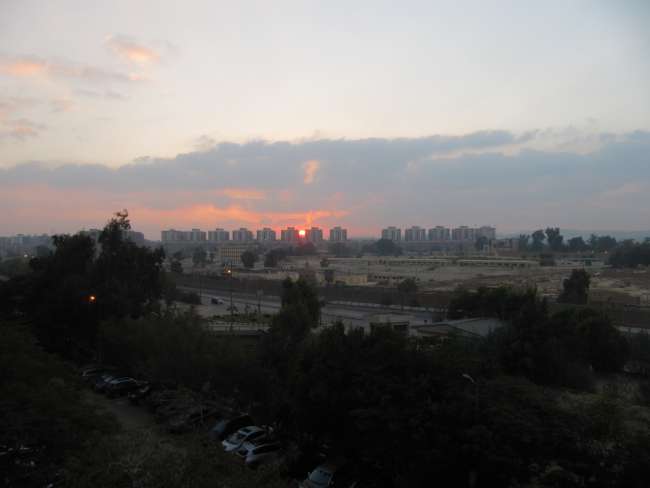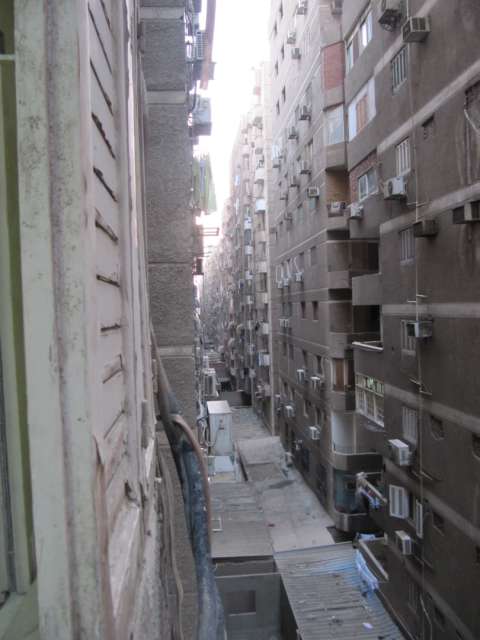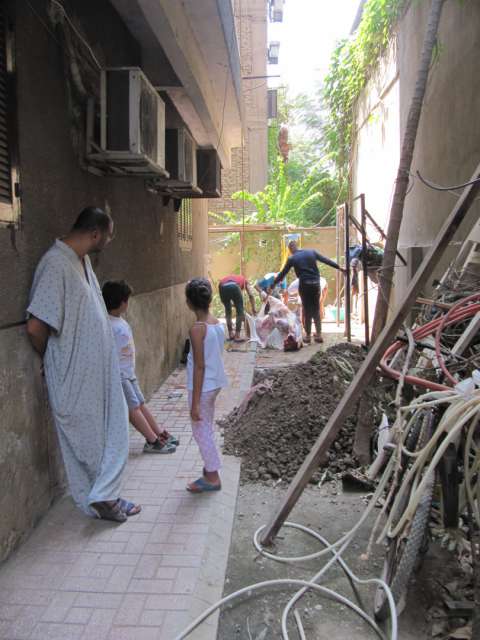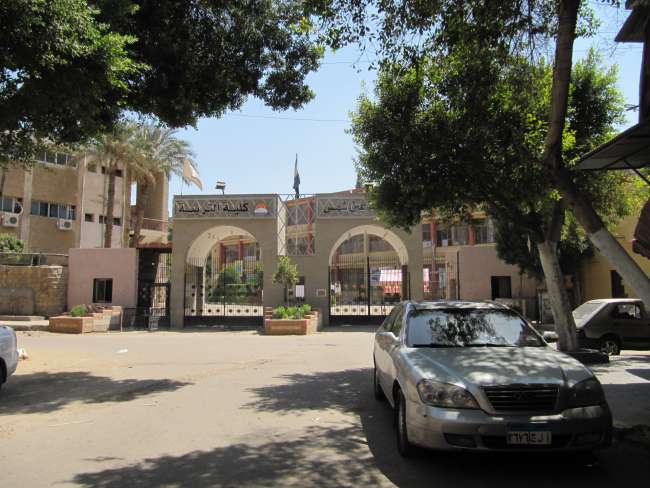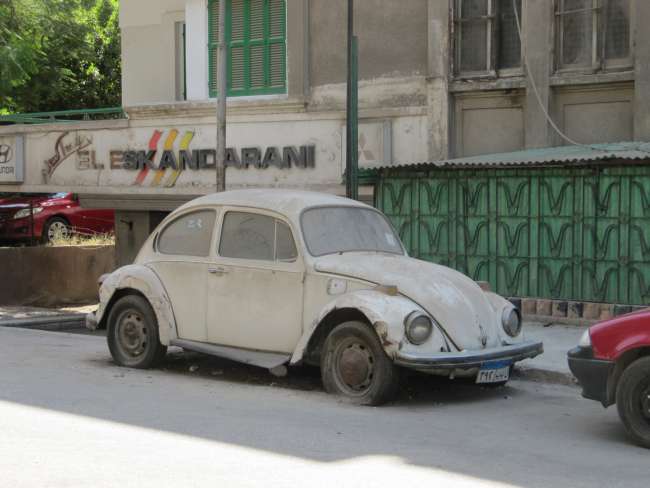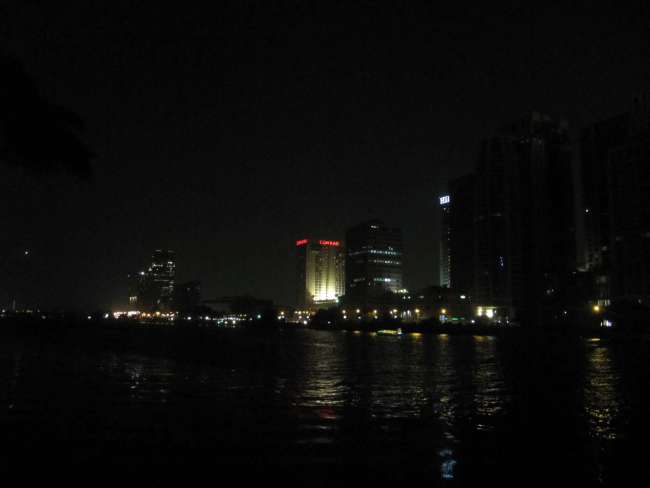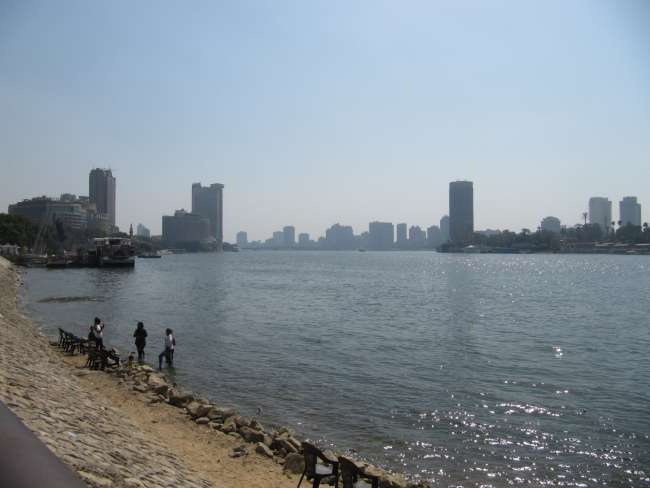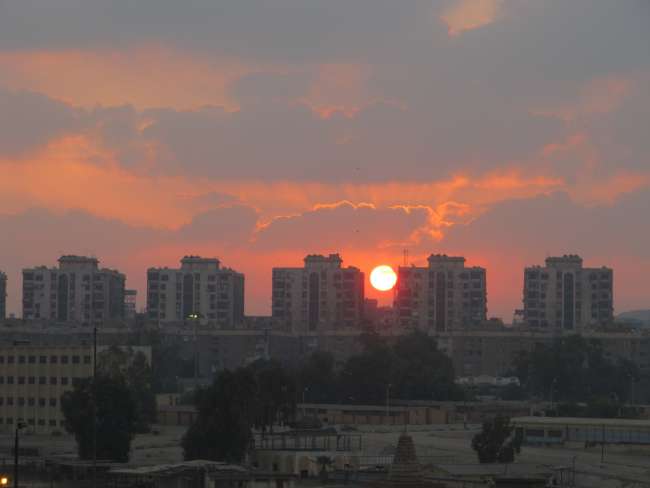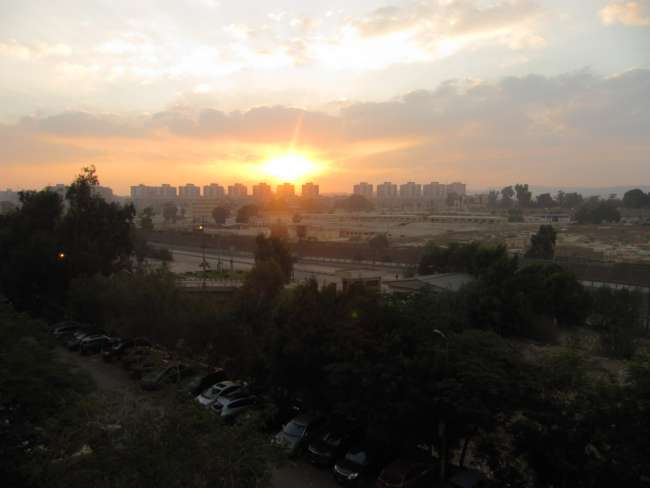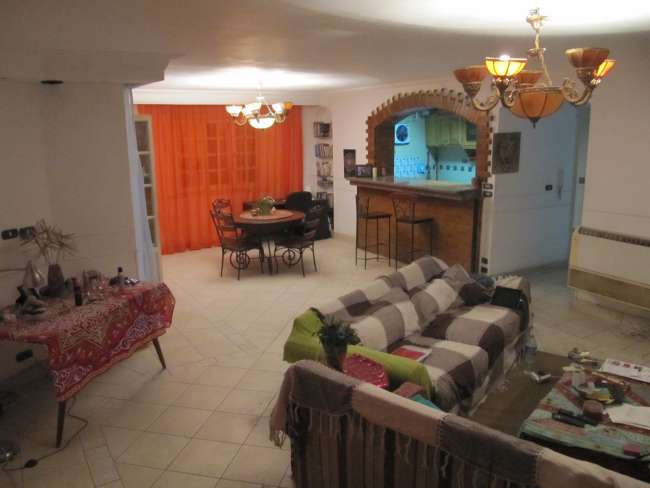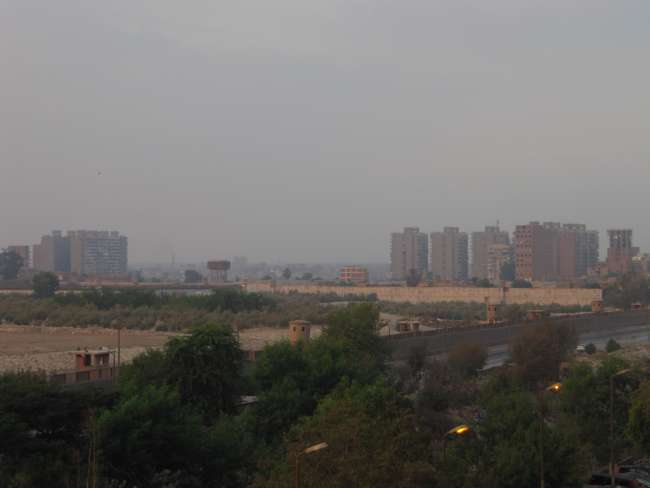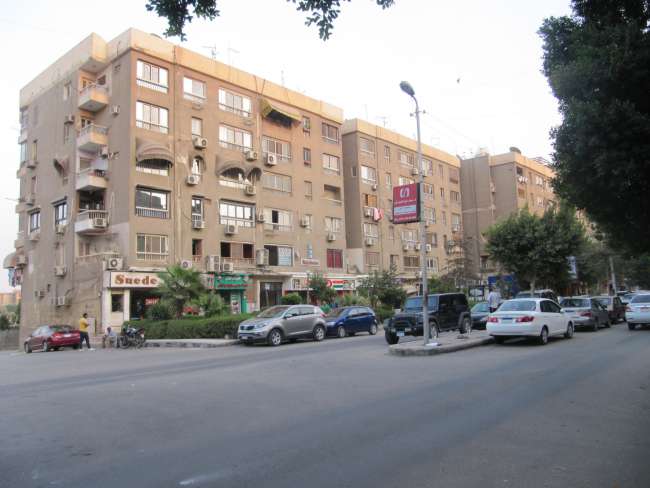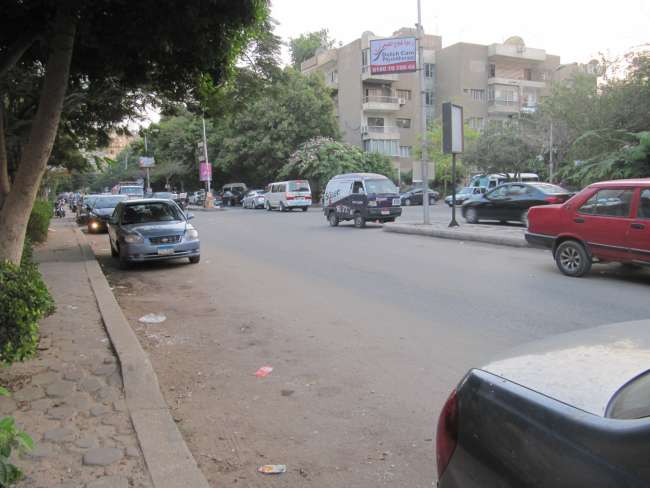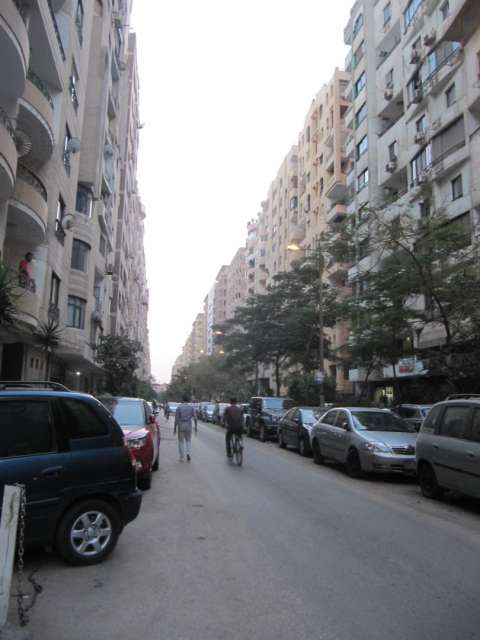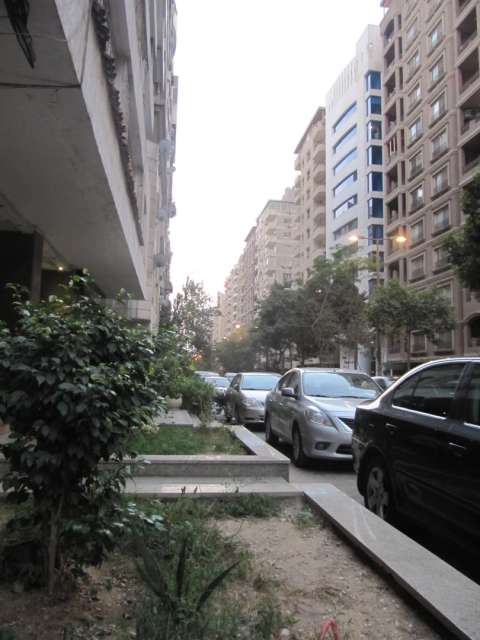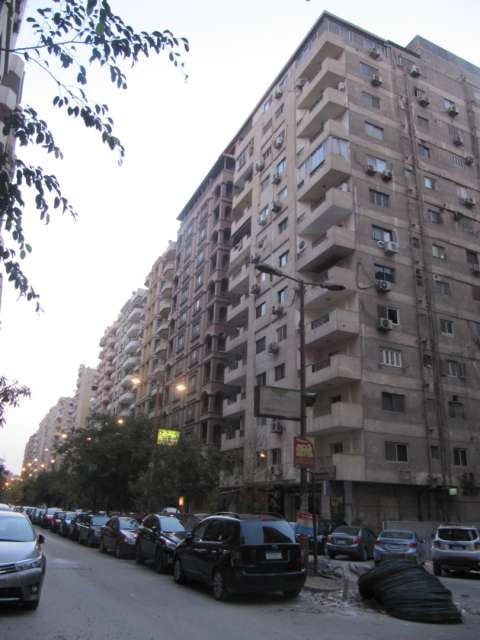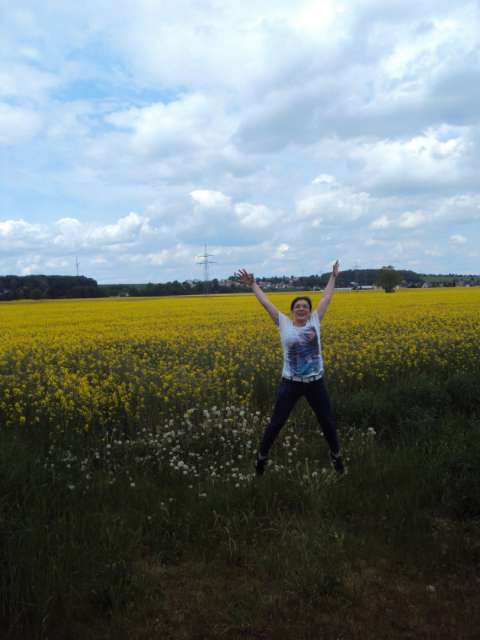
unterwegsaufadlerschwingen
vakantio.de/unterwegsaufadlerschwingen
Arrived
Ebimisami: 27.09.2016
Abonnez-vous na Bulletin ya Sango
A faint rustling enters my consciousness as I slowly wake up. The wind, I think, and I see trees swaying back and forth in my mind, their leaves gently rustling. Then the rustling gets louder, and even before I open my eyes, I know that the noise has a far less idyllic origin: the air conditioning. The hum of this white box has become almost familiar to me after over two weeks in Egypt. So familiar that I often don't even notice it anymore. Unlike on the day I woke up for the first time in this foreign country. After I had pushed my mattress directly next to the air conditioning the night before in order to withstand the nightly temperature.
Yes, of course I knew that Egypt is hot. Especially in the summer. And it lasts here until October. And I also knew that Cairo is located in the desert. However, I was not prepared for the thick wall that I hit when I stepped out of the plane, especially since it had been dark for several hours and I somehow expected that at least the nights would bring a little cooling. But that is not the case. It is at least 30 degrees celcius when I arrive at Cairo Airport. And it is hardly cooler in the shuttle bus that takes us from the plane to the terminal building. There is no air conditioning and the bus is completely overcrowded. Enclosed between Egyptians returning from their vacation or business trip from Germany, I think with a wry smile on my face, 'Welcome to Egypt.'
I will spend half a year here now to study a semester at Ain Shams University. As part of the binational DaF master's program in Leipzig. The lectures in Cairo start in mid-September, right after the Eid al-Adha, the most important celebration in Islam. I am arriving a week earlier to have some time to find my way around this largest city in Africa, which has a population of over 20 million.
It is Sunday when I arrive, the eve of the festival. Familiar people who picked me up from the airport and will be my hosts for two days tell me that many Egyptians have left the city for the holidays. So there is nothing going on on the streets. Nothing going on? Incredulously, I look out of the window of our taxi and wonder what this chaos has to do with the words 'nothing going on'. According to my understanding, there is a lot going on on the four-lane road we are traveling on. It is almost overcrowded with everything that has wheels and even hooves: expensive cars pass old, rusty carts on the right and left. And our taxi driver zigzags through the turmoil. In front of us an old truck, on the loading area of which a cow swings back and forth. According to my hostess, it will not survive the Eid al-Adha. Just like the goats that are driven along the roadside in order to find a buyer. And then suddenly we overtake a donkey cart that is trotting purposefully in the middle lane. A horse-drawn carriage a little while later.
Half an hour later we arrive in Maadi. In record time, as I later find out. I begin to understand that the designation 'nothing going on' has less to do with the density of traffic than with the fact that there is any movement at all. On other days, the journey from the airport to Maadi could have taken two hours.
The district of Maadi is located in the south of Cairo. It is mainly inhabited by the wealthy population and foreigners. So also by my hosts, a German family that has been living here for decades. And I will also move into a shared apartment here.
For a district in a country that consists mainly of desert, Maadi is surprisingly green. Palm trees and other plants grow everywhere along the roadside, often at the expense of the sidewalk. By now, like everyone else, I have gotten used to walking on the street. Using the sidewalk involves too much effort: It is interrupted every few meters by flowerbeds, parking spaces, garage entrances, and who knows what else. Which would mean for the pedestrian to switch back and forth between the street and the sidewalk every second. However, since the curbs are about half a meter high, hardly anyone bothers to use them at all. To the delight of the drivers, who have even more reason to honk their horns on narrow lanes.
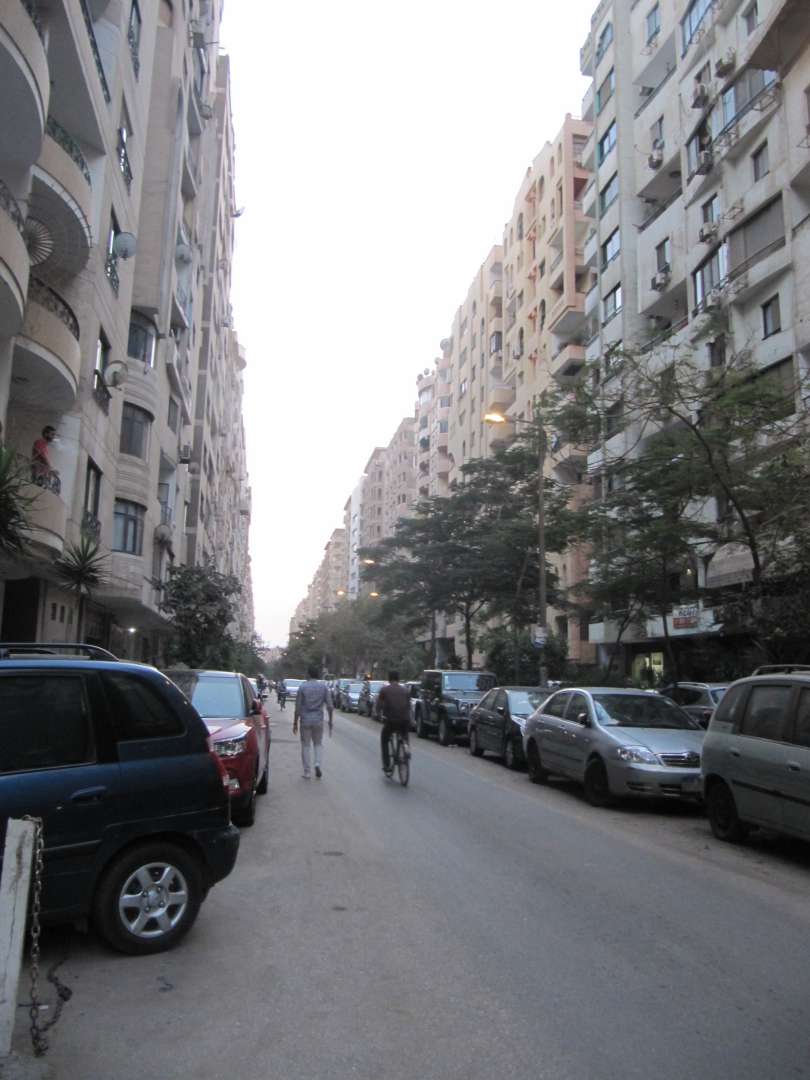



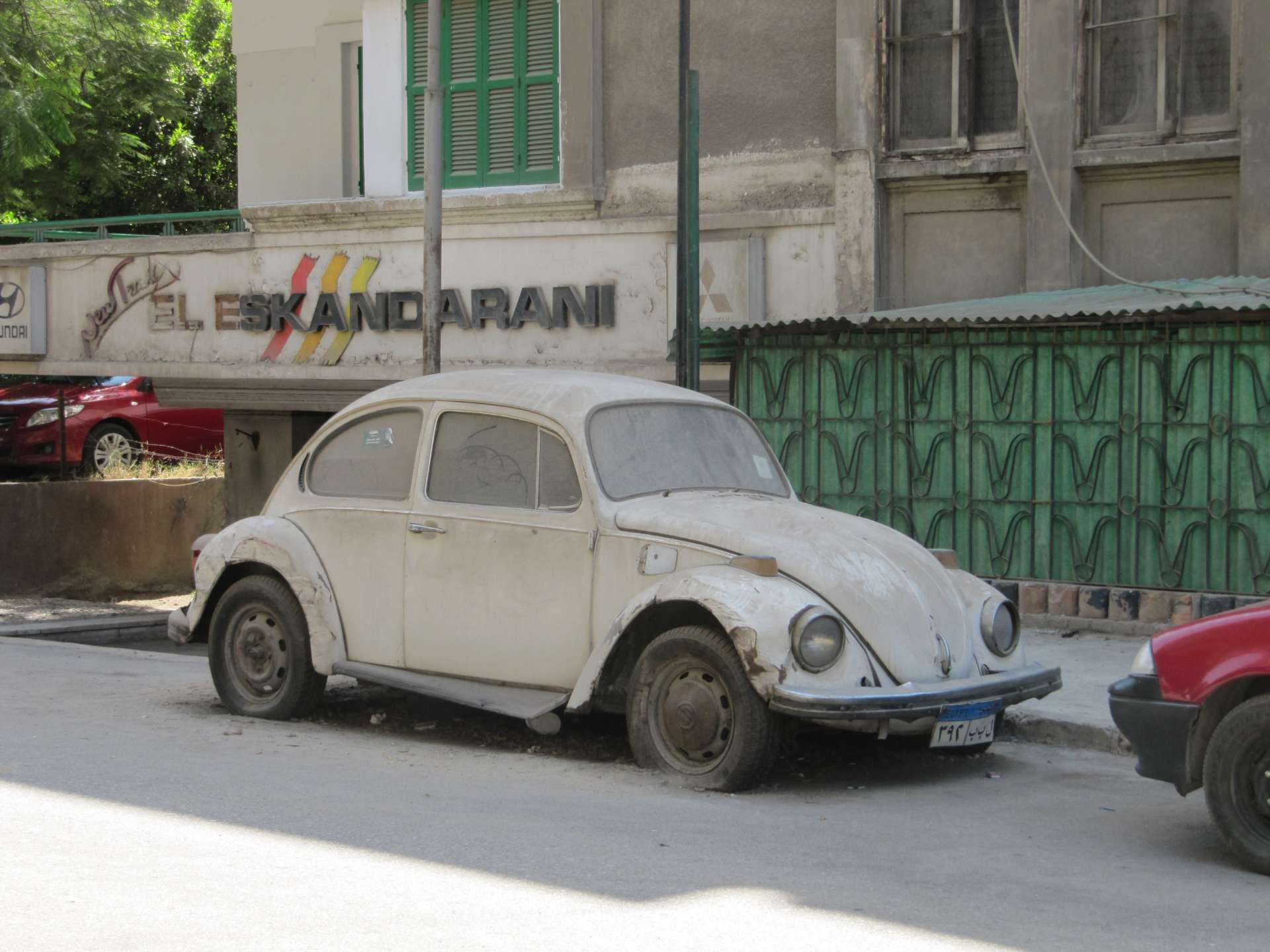
My hosts live in a multi-story house in a side street near the Nile. After the taxi driver handed us our luggage and removed the suitcase that he had fastened to the roof, we go up to the 8th floor of the house. And yes, there is an elevator. It doesn't seem very reliable to me, though. The heat and my exhaustion make me ignore it.
When I arrive in the apartment, I collapse on the mattress that is already waiting for me in the living room. Tired, I look around and notice that the apartment is not only very large, but also bright and clean. The large air conditioning and the white tiled floor are striking in all the rooms.
On the first day, I stay with the family to help a former classmate move into her new apartment, which is located in the same building. Like me, she studied here for a semester and then decided to stay with her husband. Initially, we have to clean until we drop. As is customary in Egypt, the previous tenants left not only the furniture, but also a lot of dirt. There probably wasn't a handover of the apartment. Armed with cleaning supplies and a cloth, I tackle the bathroom. When a black creature with more than four legs crawls out from under the broken washing machine, my initial motivation dwindles. But I persist. And when we finish our work in the evening, sweaty and covered in dust, the rooms look much more comfortable.
The next day, I move into my shared flat. My hostess wants to take me there in a taxi in the morning. However, it ends up being the afternoon. Her landlord has invited us to be part of an important part of the Eid al-Adha: They have acquired a young cow that is to be slaughtered in the courtyard in the morning.
The Islamic Festival of Sacrifice recalls a story that is found in both the Quran and the Bible: God tests Abraham by ordering him to sacrifice his own son. When he recognizes Abraham's willingness to follow his will, he stops him at the last moment and has him sacrifice a ram instead.
The festival lasts a total of four days, from Monday to Thursday. During this time, people spend time with their families, the streets are 'empty', and most of the shops are closed. Devout Muslims sacrifice an animal during the celebration and distribute a portion of the meat to the poor. My hostess says it is a sign of prestige to be able to afford a cow. The taxi driver who picked us up from the airport said that he and a neighbor bought a cow for 15,000 Egyptian pounds, which is the equivalent of 1,500€. For those who cannot afford it, there will only be a goat.
With mixed feelings, I decide to accept the invitation. I have never seen an animal die before. Except for some insects that I was not entirely innocent of killing. And then there was my guinea pig that died of an illness. That is one thing. Killing a healthy, young cow is another. On the one hand, I am curious, on the other hand, the thought scares me. Unlike the children who stand next to their father right in front of the cow. The women watch from the balcony. None of them seems disgusted or shocked during the whole ceremony. Unlike me. For the first time in my life, I seriously consider becoming a vegetarian. Not because I couldn't stand watching the dead animal being sliced apart. After all, you see meat lying in the supermarket every day. That's hardly a problem for me. What shocked me, however, was how the cow's throat was cut. I was told that it was an easy way for the animal to die. It would slowly fall asleep while bleeding out. While the blood was being caught in the trench that had been dug around the animal and covered with earth later. However, the whole thing didn't seem to me like it had been easy for the cow. As if it hadn't suffered.
With a strange feeling in my stomach, I leave the scene.
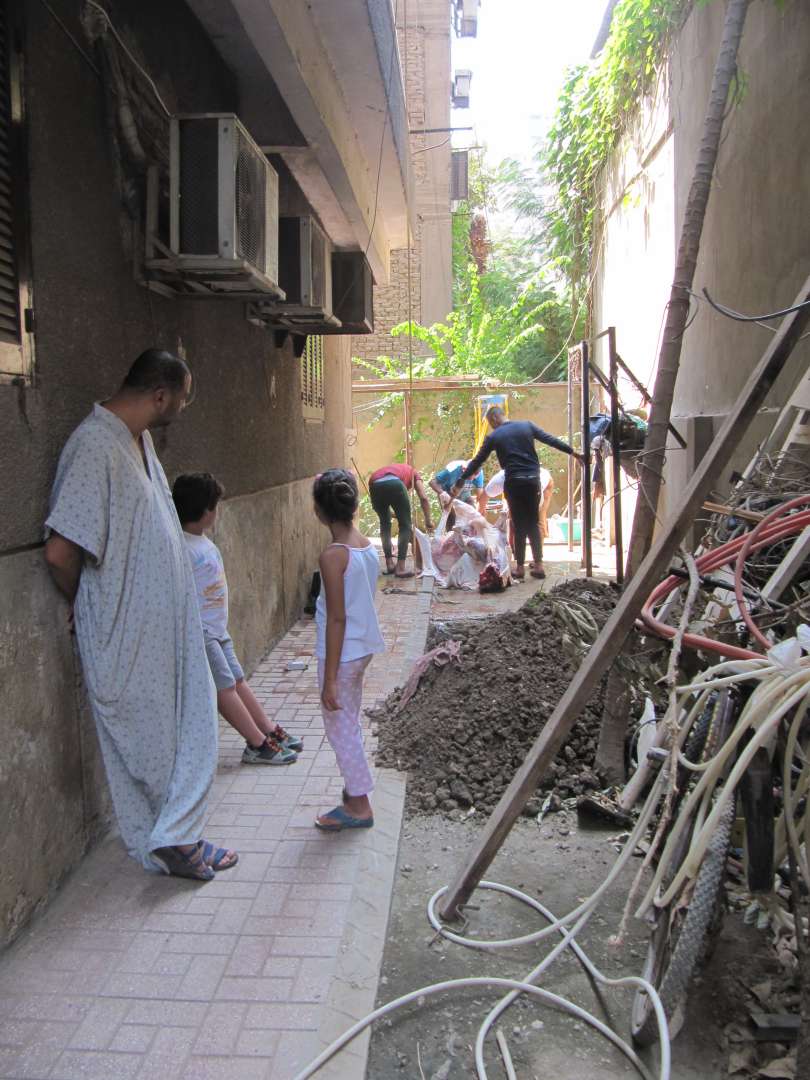
A little later, we drive to my shared flat. It is located on the southern edge of Maadi on the fourth floor of a twelve-story building. We are greeted by Lulu, one of my future roommates. The second one, Maruh, has gone away for the holidays. After my acquaintance says goodbye, Lulu shows me around the apartment. I am positively surprised, to say the least. The apartment is large and bright and above all clean and tidy, which is not self-evident here, according to my acquaintance. The kitchen and the living room are separated by a bar. I have come to love the comfortable sofas in the TV corner, right next to the air conditioning.
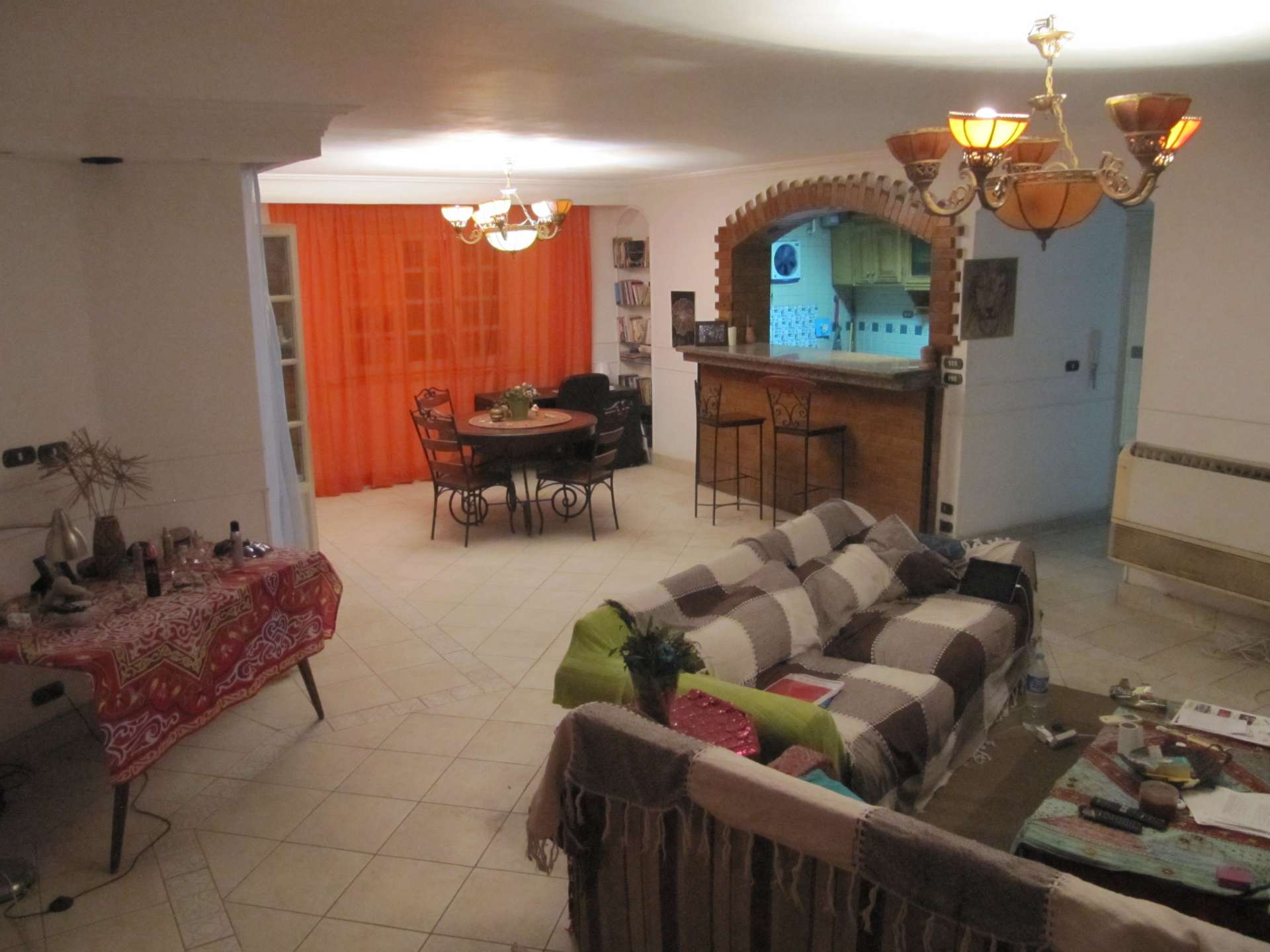
And finally, the balcony should be mentioned, which leads out from the living room to the street and from which you have a good view of the south of the city. Admittedly, neither the dirt nor the heat invite you to spend a lot of time on the balcony. Unless you get up just before sunrise and sit outside with a cup of coffee. However, I have only managed to do this once so far.



My room is surprisingly large and adequately furnished. Unfortunately, the air conditioning is broken, but there is a fan in the room. A few days later, when the temperatures are still above 30 degrees even at night, I realize that the word 'but' is not really applicable. It hardly makes a difference whether the fan is running or not. The windows in my room are not tight, but the colored windows create a pleasant atmosphere in the room. The view is less thrilling: I am looking at a kind of backyard when I look from the balcony. However, it is not an accessible courtyard, a few meters away is the back of the next house
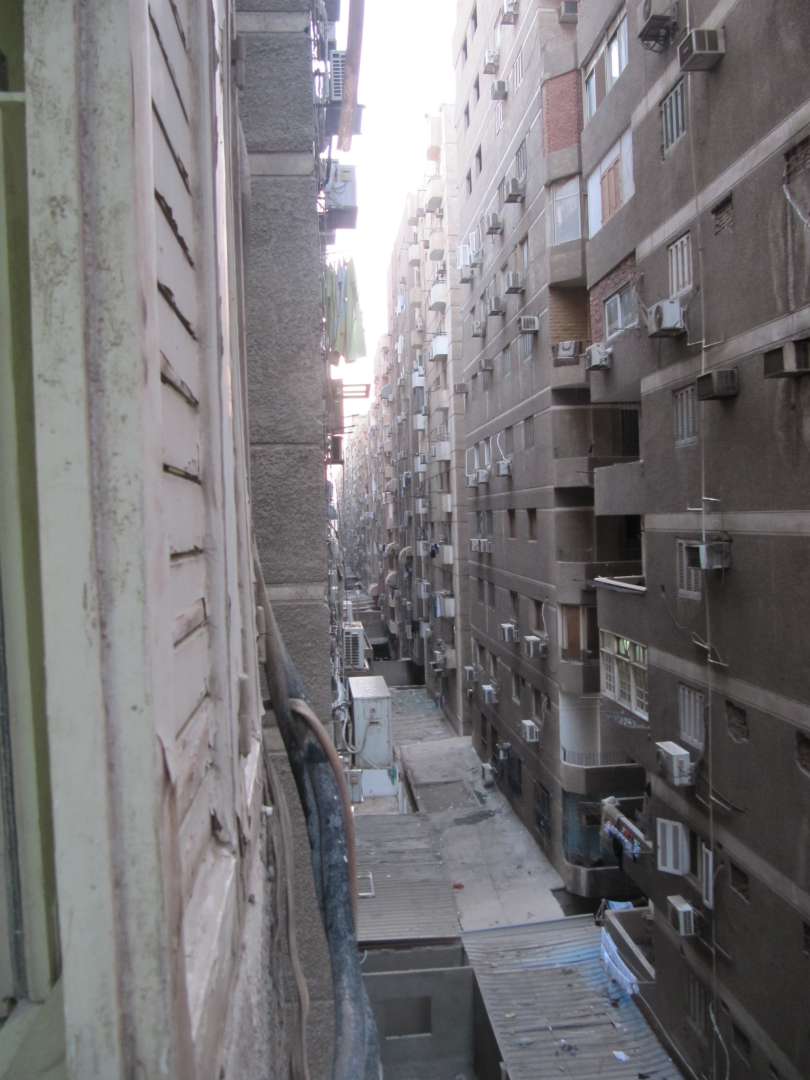
Despite some deficits, I have felt at home in my new home from the very beginning and settled in very quickly. I spent the rest of the week exploring the neighborhood and testing the way to university. It leads me through half the city and costs me almost an hour and a half. I drive alone with the metro for 40 minutes. Since I only have to go to university twice, at most three times a week, I find that okay. After all, I live in the safest district of Cairo and have two nice roommates who showed me a lot and explained things to me in the first week.
If I'm lucky, I will catch one of the new trains that are equipped with air conditioning and announce the stops in English. In the worst case, I look for a seat as close to the window as possible to catch a little breeze. Every train has cars that are exclusively for women. These are usually not crowded. If a man accidentally ends up in such a car, it can be very uncomfortable for him: Suddenly the women start screaming. In the crush at the door, I recognize a group of men trying to squeeze into the car. The older women fend them off with hands and feet. When one of them suddenly stands in the car, he has to take some blows. The security forces, who walk back and forth on the platforms, want to intervene, but they cannot prevent the women from keeping the man in custody until the next station.
During my first test drive with the metro, I make a stop at Tahrir Square and walk from there to the banks of the Nile. Before I know it, I am surrounded by a horde of teenagers who ask me if they can take a selfie with me. Germans are very popular in Egypt, as I have learned. Unlike the British and the French, they are not associated with negative stories from colonial times. In addition, Germany is opposed to the British in World War II, who at that time occupied Egypt. People hope for liberation by the Germans. And finally, Hitler has killed numerous Jews - that seems to be sufficient reason to sympathize with him in a country that has fought wars against Israel several times. Unfortunately, the education system in Egypt is very poor, and not everyone seems to realize that they would probably have been next.

The events at the university started on the Saturday after my arrival - the beginning of the week. Friday is a kind of holiday when the Friday prayer is held in the mosques in the morning, combined with a sermon. This is also the case with most Christian services. After all, 10% of the population are Christians. I have visited an international community in the last two weeks, which meets in the evening under a large pavilion in the garden of another church. And there is also a tiny Jewish community in Cairo, with the last 10 members who are all over 60 years old.
Most shops reopen in the afternoon. There is no weekly holiday here, as we have on Sundays. That's why I have university on Sundays. And maybe every other Wednesday. The timetable is not yet one hundred percent final. I hope to be able to swap a didactics module. Neither the content nor the teachers have really excited me so far, as much of it is already familiar to me from my bachelor's studies.
It's different in my second module on Arabic language and culture. The cultural professor really managed to captivate us for three hours with his story about the revolution in Egypt and its background - three hours without interruption! He spoke to us as a person who has experienced all these things himself, not as a teacher - I think that really touched all of us.
Our language teacher has also made a big impression on us in a different way. I have never met a person who manages to constantly have such a wide grin on his face as he does. I haven't quite figured out whether he is so enthusiastic about his subject or about us. Or maybe both. He demands a lot from us, which I think is good.
In any case, I am looking forward to the next events with both lecturers.
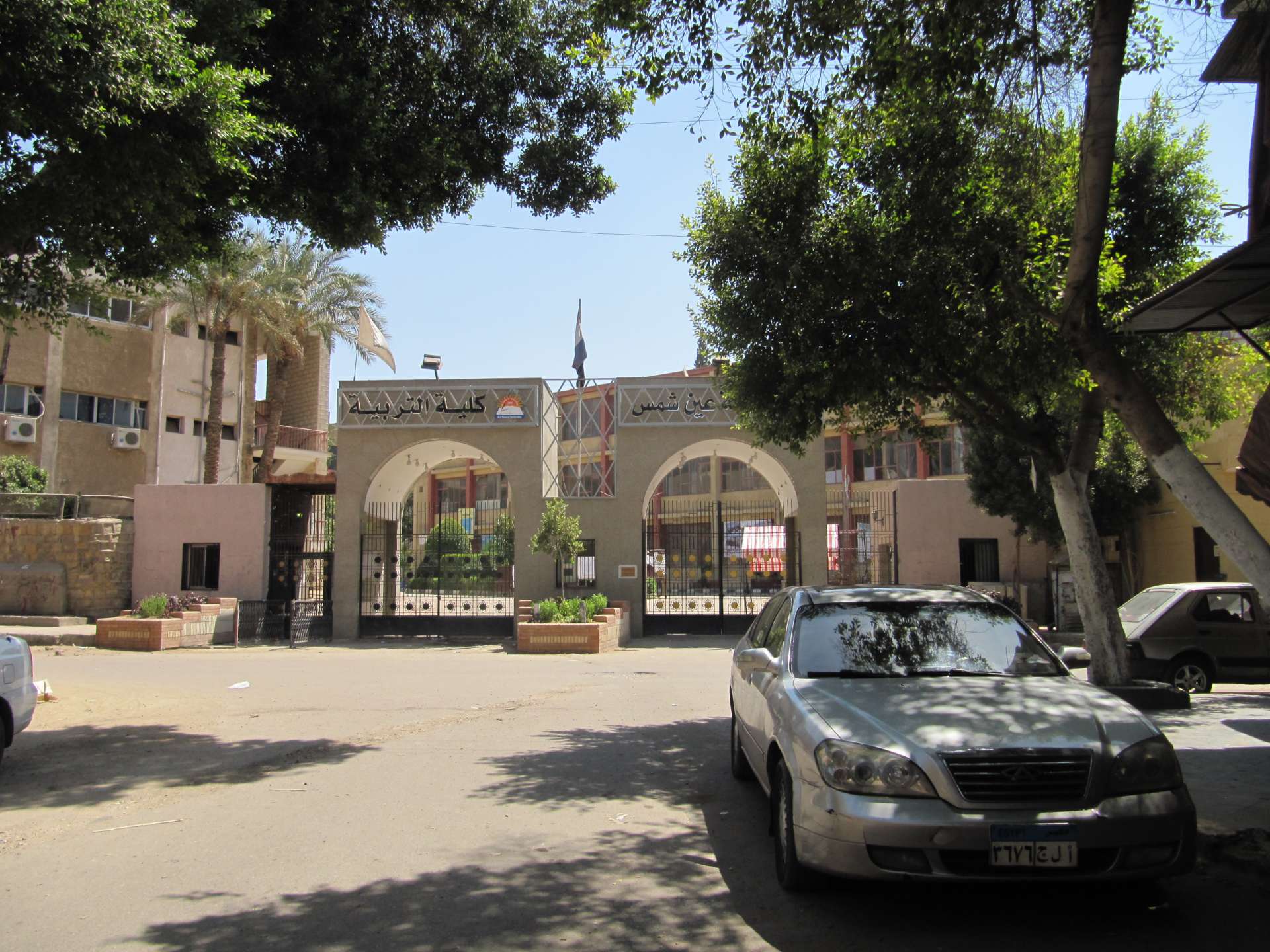
From Sunday to Wednesday, I attend a language school just around the corner from me, where Lulu also works. I have started a course in Egyptian dialect here, together with two other German girls, a French girl, an Englishman, and an American. Three hours per day. The school's director, a friend of my roommates, offered me the option to pay for the course once I receive my money from the BAföG office - which is unfortunately still pending.
I haven't seen much of the city itself yet. At least not the tourist attractions of the city. Things that I have associated with this country until now. Before I even thought about actually living here for a while, the pyramids were primarily what came to mind. My flatmate said you can see them from the balcony. On good days. That means when the smog doesn't blur the view of the city. I haven't experienced such a day yet.
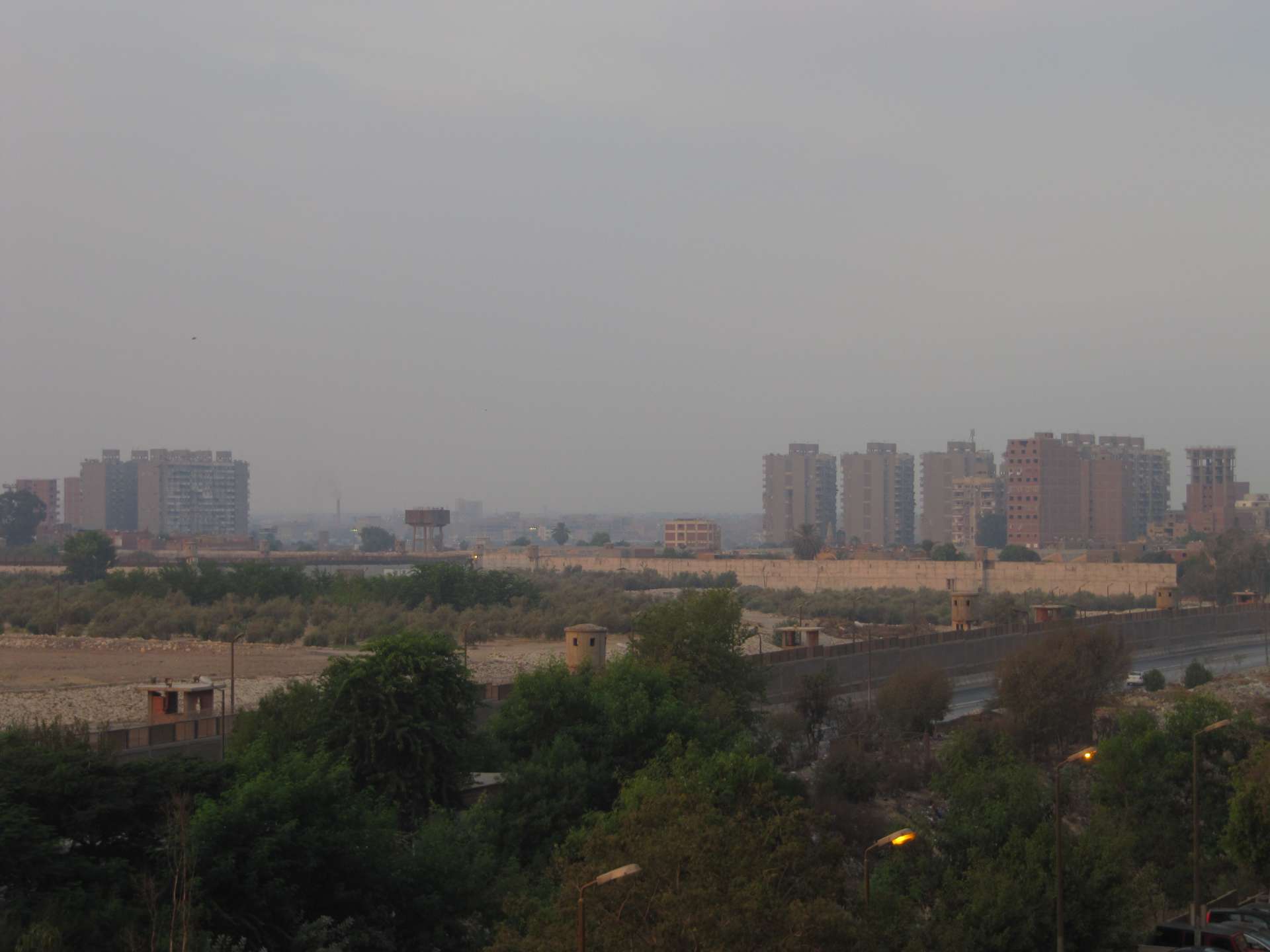
Instead, when I look from the balcony, I look directly at a cemetery. It is located on the grounds of a prison. It is visible in the distance behind the small mud huts of the cemetery. Many political prisoners are said to be housed here, including supporters of the Muslim Brotherhood and representatives of the old regime. But also young people who have turned against current politics.
In front of the prison walls, I see one of the many multi-lane roads that run through the city. And I see what defines Cairo for me the most after three weeks in this country: Apparent chaos.
Strangely enough, I feel comfortable in this chaos. I enjoy walking through the streets and having this colorful jumble in front of my eyes.
I have quickly learned to find my way around, to confidently weave my way between cars without being run over. I know where the cheapest supermarket is, which merchants don't charge me twice or even ten times the price because I am obviously a foreigner. Especially thanks to Lulu, who has taken an incredibly amount of time to show me everything.
As I write these lines, familiar music reaches my ear: the call to prayer, which reverberates from speakers on every corner of the street, mixed with the almost constant honking of cars in a city where honking is theoretically prohibited. And there's the buzzing air conditioning next to it.
I often don't even notice the air conditioning anymore. The singing, which calls Muslims to prayer five times a day - at sunrise, noon, afternoon, sunset, and once again at night - makes me listen joyfully again and again. Because it briefly tears me away from everyday life, which has crept in so quickly. And it reminds me where I am and that I have the opportunity to immerse myself in this foreign country for half a year, to get to know the people who live here, and to learn the language.
And then there's the constant honking. I haven't really figured out what it's supposed to achieve. People honk here when there is nothing and no one in their way for miles. And then when the streets are congested and it is obvious that honking will absolutely not change anything about it. And people honk before they overtake someone or almost run over a pedestrian. Although it seems very doubtful that anyone recognizes a warning signal as such when they hear it ringing through the streets every second.
The people I meet here usually first ask me if I like Egypt. Then they shake their heads at my answer. In their eyes, it seems hardly understandable that I feel comfortable here as a German. Yes, it may be easy for me to answer this question affirmatively. Because whether I am just a tourist here or studying here for half a year, I am and will remain German. I am only here for a limited time and will return to Germany, where the usual prosperity awaits me. Where I definitely lead a very pleasant life with my rights and freedoms. However, this does not mean that I am blind to the negative. I just don't only see the dirt and the decaying houses. But also the people who have warmly welcomed me here from the first day. The acquaintances who picked me up from the airport and organized this wonderful shared flat for me. My roommates. The young couple I met on the plane and who picked me up a few days later to show me a bit of the city and invite me for coffee. The nice students who sat down with me when I was at university an hour too early again due to a change in the schedule. Who sang and played music so wonderfully and with whom I laughed so much. And the people who have given me incredibly memorable insights into this country through their stories and helped me to understand some things better. And who didn't try to sell me their personal view of things as the universally valid truth, as the press does every day.
And finally, there is also the chaos on the streets, which initially seemed so inscrutable, but ultimately somehow works.
'Whoever has not seen Cairo has not seen the world. ...,' it says in 'One Thousand and One Nights'. That may sound a bit exaggerated, considering that the world is so incredibly big and has so much to offer. So why this one city? One probably really has to have been here to understand this statement. One must have gotten to know the very special character of Cairo, experienced the hustle and bustle on the streets and in the alleyways away from the tourist places. Then one cannot avoid believing that one definitely would have missed something if one had not seen this part of the world.
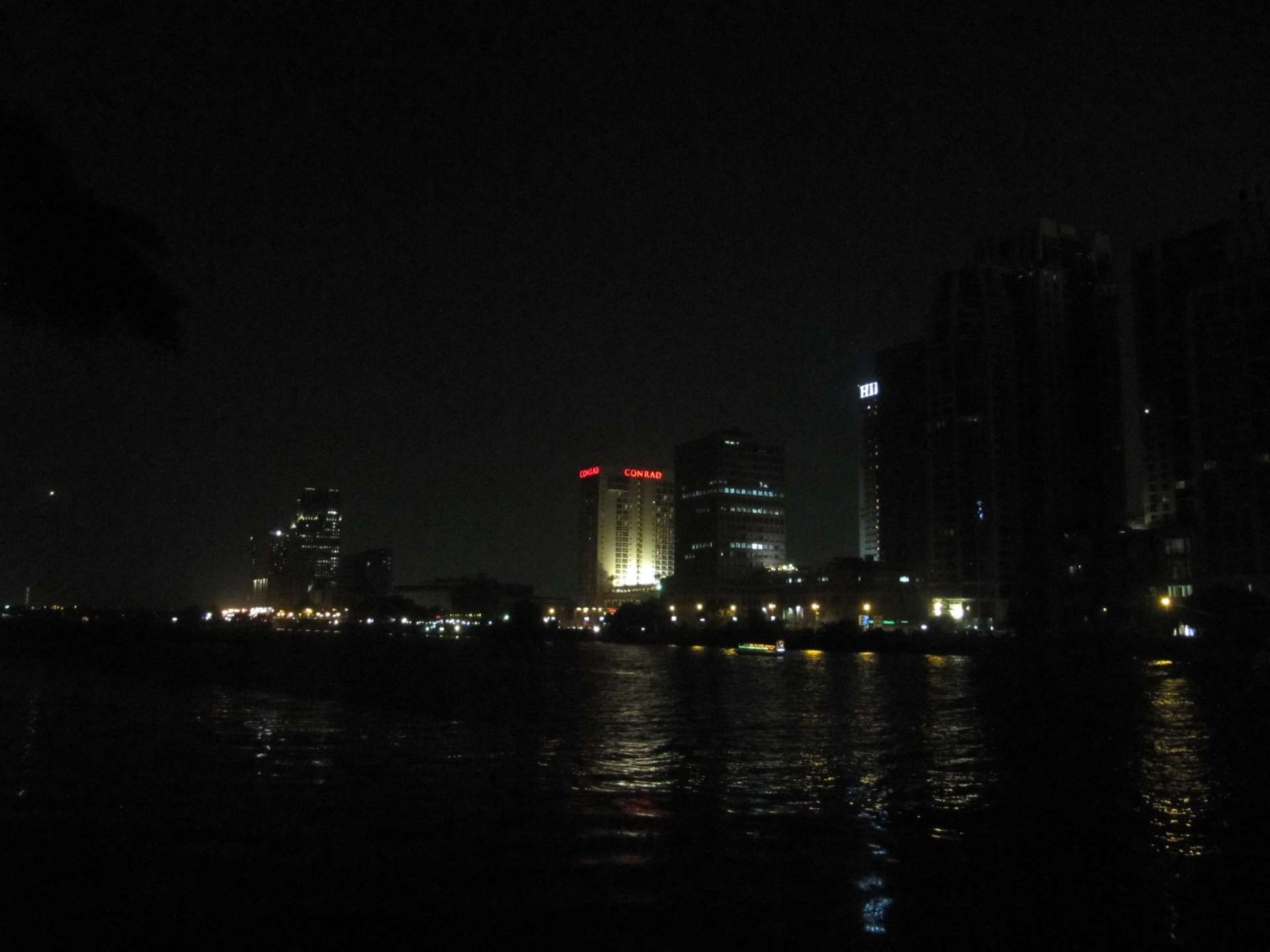
Abonnez-vous na Bulletin ya Sango
Eyano
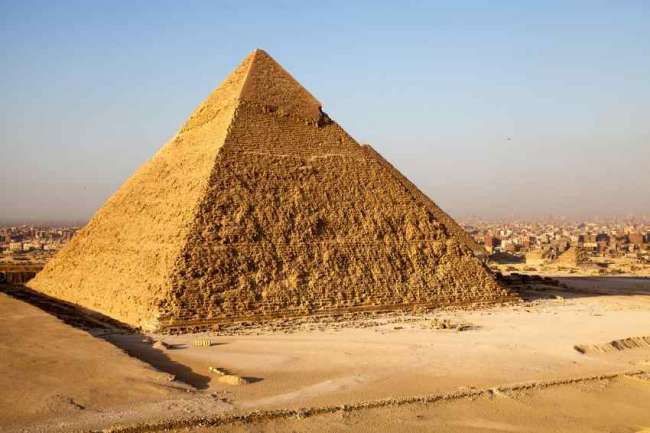
Lapolo ya mobembo Ezipito

